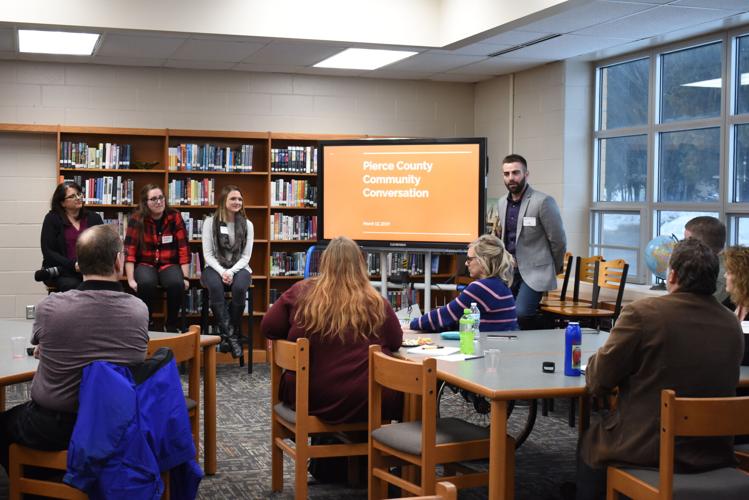Facilitating discussion and solutions for employing people with disabilities in the local workforce was the primary focus during a first-ever Pierce County Community Conversation (CC).
Local businesses, employees with disabilities and citizens were represented at this solutions-based meeting held at the Ellsworth High School Library March 12.
River Falls and Ellsworth school districts, Project SEARCH and the Department of Workforce Development have representatives who gather for County Community on Transitions (CCOT) meetings.
This community conversation was organized by CCOT after Hudson, River Falls and Ellsworth school districts received funding from a Transition Readiness Grant in June 2018.
Intern Madison Olson was part of a panel at the conversation representing Project SEARCH, a transition-to-work program which encourages employment for 18-30 year-olds with various disabilities from Pierce and St. Croix County areas.
Along with Olson was Natasha Herum, a Project SEARCH instructor, and Angie Jensen who oversaw work with Olson in the surgical ward at Allina Hospital.
Herum said giving those with disabilities a chance to develop skills in a practical and realistic environment prepares them for competitive employment.
Project SEARCH, Herum said, wants their program to give their interns opportunities to be employed at companies that don't hire solely those with disabilities.
Scott Hodek, Chief of the Office of Economic Advisors at the Wisconsin Department of Workforce Development, presented statistics at the meeting which gave context for Pierce County's employability.
In Pierce County, now is "an amazing time to be looking for jobs," said Hodek.
Hodek's statistics indicated positive job growth in Pierce County, which has a 2.9 percent unemployment rate as of 2018.
But the lack of employees available for hire has "never been seen before," Hodek said.
Representatives of businesses from Ellsworth and River Falls were present during the discussion which followed the presentations.
Keeping potential employees in the area was addressed as a concern. The lack of affordable housing was discussed in conjunction with the fact that many graduates from the nearby universities have moved to the Cities for jobs.
Citizens and employees with disabilities also contributed to the discussion, which branched from two questions:
• What can we do to better prepare people with disabilities for employment?
• What can I do to better prepare people with disabilities for employment?
Angela Brenna, who works for the Center for Independent Living Western Wisconsin, answered the second question.
Brenna, who was in her wheelchair, said these types of conversations don't have to be shameful. Going to community things like this and talking about educating the public in disabilities would promote employment opportunities for those with disabilities.





(0) comments
Welcome to the discussion.
Log In
Thank you for taking part in our commenting section. We want this platform to be a safe and inclusive community where you can freely share ideas and opinions. Comments that are racist, hateful, sexist or attack others won’t be allowed. Just keep it clean. Do these things or you could be banned:
• Don’t name-call and attack other commenters. If you’d be in hot water for saying it in public, then don’t say it here.
• Don’t spam us.
• Don’t attack our journalists.
Let’s make this a platform that is educational, enjoyable and insightful.
Email questions to mthorud@orourkemediagroup.com.